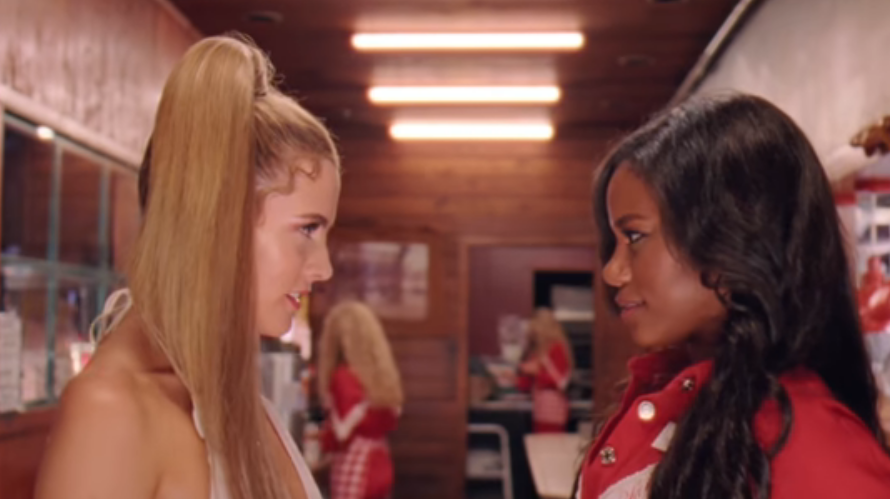In 2015, a series of tweets by A’Ziah “Zola” King described a cross-country “hoe trip” she took to Florida with a friend who turned out to be something else. These tweets were adapted into a film directed by Janicza Bravo and written by Bravo and Slave Play writer Jeremy O. Harris). Zola wasn’t the first movie I saw in a real theater, post-pandemic (that was Werewolves Within), but it was the movie that reconnected me with the social pact that is moviegoing. When I saw that Zola was playing at the Laemmle Noho 7, five minutes from where I live, I knew I was in for an ecstatic return to the movies.
I love movies, but I hate being in public. I love the act of leaving my house to go sit in a darkened room, but I hate dealing with other people, talking to other people, being looked at by and looking at other people. If you hate being on display as much as I do, leaving the private realm to enter the public one can never be a simple matter. But I have the kind of mind that just won’t shut up unless there’s a story in front of it, a puzzle that needs solving.
Zola is perfect on its own terms, escalating its appreciation of gossip and drama with every twitter chirp, leading us into Zola’s world through the playful beauty of the strip club, and then more deeply into her particular motivations for diving headfirst into a terrifyingly unsafe situation. Zola, a Detroit waitress and dancer, made friends that year with a fellow strip club dancer named Stefani. They fell into a sudden and intoxicatinglyly deep kind of friend-love, which led Zola to accept Stefani’s invitation on the “hoe trip” to Florida, pitched on the premise of making good dancing money. Zola got into the car on the appointed day to learn that Stefani had lied, not only about the real purpose of the Florida trip—setting up backdoor ads for sex, courtesy of Stefani’s pimp—she’d forced Zola into a horrifying hostage situation.
The viewer is never allowed to forget for a moment that this is a true and recent story; something that could easily happen again, and to anyone who falls too heedlessly into a hoe-mance. Zola forces us to watch someone trapped try to negotiate their way out of a situation that feels like it can end only in violence.
The theater is a small one, with maybe 50 seats, and I enjoyed some time alone inside before a couple of hipsters, and then a single woman and an older man, joined me. Every sound seemed amplified in this tiny theater; the crunch and slurp of public eating felt overwhelming, as did the sounds of the guy next to me as he groaned and stretched in his seat. The familiar unfamiliarity created a weirdly terrifying sense of the unknowable and unexpected.
What’s going to happen? I thought to myself when the dude next to me kept moaning for what might have been a little too long. Is this dude going to masturbate? (Was Zola the kind of movie someone would go to just to masturbate?) A whole drama began playing out in my head: this dude was going to whip out his dick once the credits rolled, and there was going to be absolutely nothing anyone could do about it. This wild fantasy was soon displaced by other fears: Is this latecomer going to spill the container of fragrant nachos sitting precariously in the crook of her elbow? Is the A/C going to be… too cold??
I was wildly awake, at the movies, for the first time in over a year. And Zola was intensifying this feeling. 2015 is a huge blur of trauma and subsequent recovery for me; I was too worried about balancing laxatives with Nyquil to be paying much attention to Twitter. My complete ignorance of the true story created a perfect viewing experience; it meant that almost anything could happen, short of Zola herself dying. That’s the best kind of tension to have in a film, I think—to know that anything could happen but to also know that your beloved main character is safe, or at least, that she survived.
Zola is a cautionary tale about loving too quickly, trusting too quickly, wanting to believe in the lie of being truly seen by another person.
There’s a moment when Zola and Stefani are talking about the personae they’ll adopt when taking the pole. The background goes dark and we see Zola in a series of different outfits, looking at herself in the mirror, asking herself with curiosity and delight, “Who you gonna be tonight, Zola?” This film, about perhaps the worst 48 hours of someone’s life, does such a good job of showing us who that person actually is, and why she needed an out, an escape, even if it’s just the evanescent belief in a story that will get her out of there. She wants to believe, and she wants to be.
Juan Barquin has written about the film’s relationship to the mirror, and how it never allows for a moment in which the characters are left alone completely in-frame. The incessant Twitter chirp keeps the scenes piling on to create a visual thread of deception. I thought, as I watched, is this how movies are going to be now? Maybe. But it’s a small kind of miracle that a movie can still drag anyone away from their cool, quiet home to sit in the dark with a handful of loud strangers, where anything, absolutely anything can happen.






